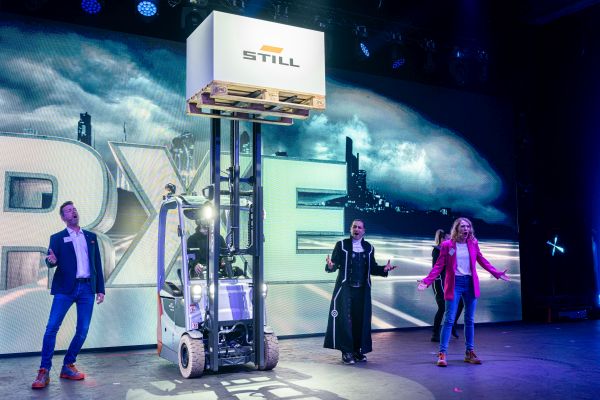Archives
Feature, Freight News, Logistics
Less can be more in the world of forklift trucks
[ September 23, 2022 // Chris Lewis ]The forklift truck industry needs to get back to basics and offer a range of simpler products more in line with many customers’ needs, said Frank Müller of equipment manufacturer, STILL.
Mr Müller, who is senior vice president of brand management at the German-company – part of the Kion Group, which also owns forklift maker Linde – unveiled plans for STILL to offer a range of simpler, forklift and warehouse trucks suitable for less intensive applications.
In future, STILL will offer a Classic Line range of products alongside its high-tech Xcellence Line. The former will offer slightly lower spec trucks suitable for operators with relatively simpler needs that will be price-competitive with trucks offered by Chinese-based companies. (In fact the Classic Line trucks will be made at STILL’s plant in China.)
At a press conference – and floorshow – to launch the new strategy at STILL’s manufacturing plant in Hamburg on 21 September he said: “Solutions are increasingly being sought for simple applications. This may well be the truck without the full package of equipment variants. An entry-level truck – ready-made and quickly available.”
However, he promised that there would be no compromises in terms of quality, safety or service.
STILL expects the Classic range to account for perhaps a third of future sales in the EMEA region, but the proportion in the Middle East and Africa could well be higher than this. Initial capital cost savings compared with the Xcellence line could be of the order of 10-20%.
The Xcellence Line would offer the most advanced technology for demanding applications, and would be highly variable and customisable. The centrepiece of this line will be the future RXE series, the next generation of electric forklift trucks, which will gradually replace the existing RX series in all weight classes.
STILL also sees a future dominated by electric trucks powered by lithium ion (li-ion) batteries. Nowadays, there are few, if any tasks that are beyond the physical capabilities of li-ion electric trucks compared with their internal combustion engined counterparts.
However, in the longer term, trucks by powered by hydrogen and fuel cells, which it is already beginning to develop, will also become important for some users.
STILL already has a major hydrogen fuel cell project in France with a fleet of over 100 trucks and plans to become the first OEM to set up its first production line for 24-volt fuel cells next year. But adoption of the technology depends on the availability and cost of hydrogen, especially for companies that opt to buy supplies of the gas rather than generate it themselves through solar panels or windmills at their premises.
Modern hydrogen systems are completely safe, said a STILL spokesman, with tank shut-off valves and systems to prevent concentrations of the gas building up beyond safe levels. Popular perceptions coloured by the Hindenburg and R101 airship disasters almost a century ago are completely out of date, he said.
Li-ion batteries will increasingly replace lead-acid batteries, as they offer faster charging, lower weight and higher and more consistent power output. Lead-acid technology is now over 100 years old but their heavy weight and slow charging are major disadvantages. Li-ion batteries, in contrast, can often be recharged during short pauses in operations and can offer much higher availability.
While there are capital costs associated with switching to li-ion batteries, the lower running costs can easily offset this.
STILL also expects internal combustion-powered forklifts to be phased out, at least in Europe and other developed markets although they may well linger on in regions such as Africa or Asia.
Automation of forklift trucks will also become more widely adopted in future. However, said Mr Müller, while automating operations at ‘greenfield’ sites in brand new premises was relatively straightforward, it was much less easy to do this in an existing, possibly very cluttered warehouse – and this would be the situation that most forklift truck operators faced.
STILL aims to remedy this with smart solutions such as self-learning trucks that can cope with unfavourable conditions. It also sees growing demand for automation solutions that can be implemented quickly and are scalable, a trend fuelled by the shortage of skilled workers.

Tags: STILL; Kion Group












